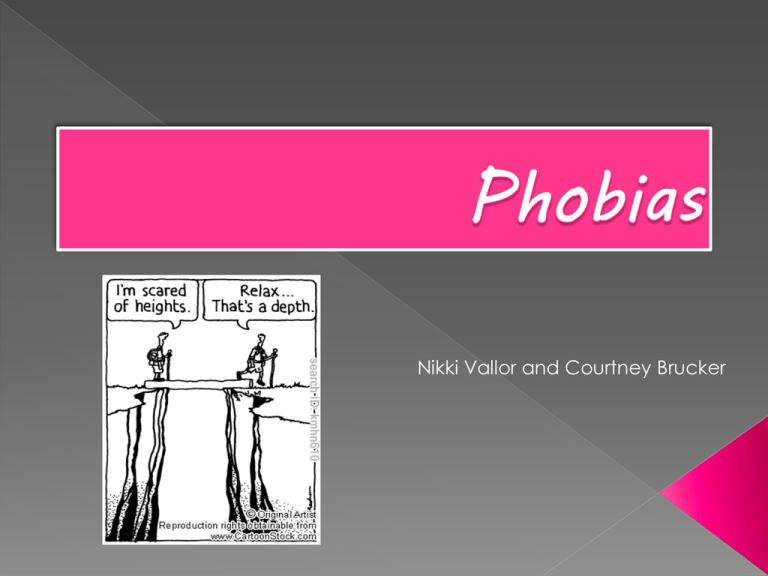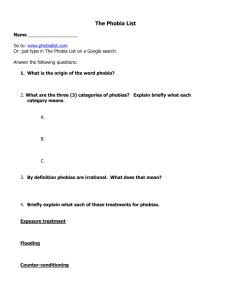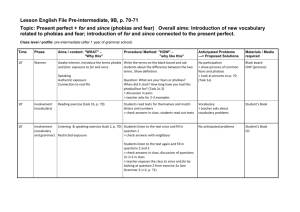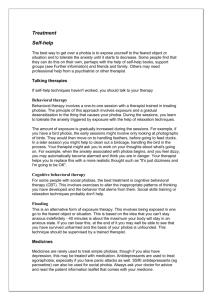Phobias
advertisement

Nikki Vallor and Courtney Brucker An anxiety disorder in which a person has a persistent , irrational fear and avoidance of a specific object of situation. Phobias are directly related to anxiety disorders. Phobias are stimulated by irrational fears due to a situation where anxiety is a mental disorder. Symptoms of phobias are both emotional and physical. The closer a person is to their fear the greater the anxiety will be. Common symptoms are: › › › › › › › › › › Shortness of breath Accelerated heart rate Chest pain Trembling or shaking Feeling of chocking Sweating Nausea or stomach pain Feeling lightheaded or faint Hot or cold flashes Feelings of detachment from yourself The actual cause of phobias is undecided Some purists believe there is an organic base for phobias and this is supported by the fact that phobias occur more commonly in the first generation of siblings. Others believe that people learn phobias by observing others or their parents. Phobias cannot be diagnosed in children under the age of 18 unless they have been consistent in symptoms for longer then six months. There are no laboratory tests for phobias The diagnosis of phobias is based off of the patients experiences. Phobias are hard to diagnose because they very for each individual. Behavior modification and desensitization are the most effective treatments for phobias. Medicine can be used to decrease the effects of anxiety but does cure the phobia. Therapy is used to pinpoint the reasons for the phobia can help to elevate anxiety but therapy is not beneficial in all cases. The goal of treatments is to make the individual feel as if they are in control of the situation that causes their anxiety. The multi-treatment approach to overcoming phobias is always beneficial. Desensitization has the highest cure rate and is the quickest treatment for phobias. A well respected anxiety and phobia center is the Anxiety and Phobia Treatment Center in White Plains, New York. This center was established in 1971 and was the first hospital-based clinic in the country. The goal of this center is to increase functioning and reduce symptoms of those dealing with phobias. One branch of phobias is social phobias. › Social phobias are fears of situations in which embarrassment may occur. › They provoke an immediate anxiety response. Another branch of phobias are commitment Phobias › Commitment phobias are people who have fears of committing in any type of relationships. There are approximately 530 phobias in today’s society Top ten common phobias are: › Arachnophobia: Fear of spiders › Social phobia: Fear of social situations › Aerophobia: Fear of flying › Agoraphobia: Fear of not being able to escape a situation or event › Claustrophobia: Fear of small spaces › Acrophobia: Fear of heights › Emetophobia: Fear of vomit › Carcinophobia: Fear of cancer › Brontophobia: Fear of thunderstorms › Necrophobia: Fear of death or dead things George Washington: He had a fear of being buried alive. Richard Nixon: He had a fear of hospitals. Alfred Hitchcock: He had a fear of eggs. Sigmund Freud: He had a fear of weapons and ferns. Heering, J. (2010, November 8). Top ten most common phobias. Retrieved from http://www.phobia-fear-release.com/top- ten- most-common-phobias.html LastCulbertson , F. (2000). The phobia list faq's. Retrieved from http://www.phobialist.com/phobia_faqs.html The anxiety & phobia treatment center. (2009). Retrieved from http://www.phobia-anxiety.org/index.htm Myers, David. (2007). Psychological Disorders. Musick, Andrea & Moscatelli, Bianca (Eds.), Psychology Eighth Edition (pp. 639-683). Michigan: Worth Publishers. Phobias. (2010). Retrieved from http://www.peaceandhealing.com/psychology/phobias Phobias and fears. (2010). Retrieved from http://helpguide.org/mental/phobia_symptoms_types_treatment Phobia diagnosis. (2010). Retrieved from http://www.mentalhealthchannel.net/phobias/diagnosis.shtml Vidican, S. (2010, November 4). Famous people and their phobias. Retrieved from http://www.metrolic.com/famous-people-andtheir-phobias-143713/



